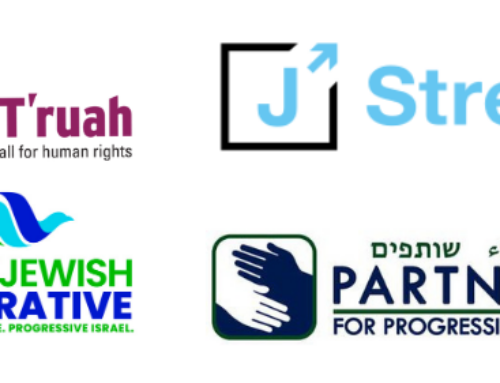 |
| Meeting with Dr. Ashrawi, center-right in cream-colored jacket. |
Visiting Ramallah (the provisional Palestinian capital) last week with Partners for Progressive Israel, we met with notable Palestinians, including Prime Minister Salaam Fayyad, the independent legislator and often-quoted activist Hanan Ashrawi, Palestinian-American businessman Sam Bahour, and the longtime PLO politician and official Yasser Abed Rabbo (a key player in the Geneva Initiative).
Our conversation with each was remarkable in its own right, beginning with Rabbo, who provided a glimpse of what might have been with the post-Annapolis negotiations between Ehud Olmert and his team with Mahmoud Abbas and the Palestinian Authority leadership in 2007-08. George W. Bush tried to lend a last-minute hand during the closing days of his presidency, even setting up a meeting under White House auspices for Abbas and Olmert to hammer out the loose ends. The date mentioned by Rabbo as having been set by Bush was Jan. 2, 2009. Rabbo fills in with an exact date what Bernard Avishai wrote about in his NY Times Magazine article of Feb. 2011:
… [N]egotiations were not formally suspended until January, after Israel attacked in Gaza. Rice had invited the sides to meet in Washington. Olmert, facing political exile and preoccupied with the war, failed to send his chief diplomatic aide, Shalom Turgeman, to the meeting. But Abbas was still determined that American diplomacy could bridge the gaps and was ready to risk the embarrassment of sending Saeb Erakat, the Palestinians’ longtime chief negotiator, to meet Israeli representatives while Gazans were under Israeli fire. “I had promised Bush,” Abbas explained. “I thought: There would be fruit from this meeting. Let us seize this opportunity.”
To this day, Abbas still expects America to put the deal over. The gaps appear so pitifully small: Ariel and a couple of other settlements, the question of whether parts of Silwan would be a part of the holy basin, a compromise number on refugees? …
We also met with Sam Bahour, a Palestinian-American telecommunications entrepreneur who told us of the horrors of attempting to do business in the West Bank while being a holder of a Palestinian identity card, which (despite his US passport) relegated him to extreme and arbitrary regulations limiting his freedom of movement, not to mention the rigged “colonialist” nature of business relations under Oslo in the first place (in his case, having to do with Israel’s stringent control over airway rights for his mobile phone operations). But what really surprised us was his revelation that the Palestinians have private funds amounting to seven billion dollars in a bank waiting for a reasonable investment climate. He later fleshed this out in an email conversation (more on this another time).
Our meeting with Hanan Ashrawi was noteworthy because of the polite disagreement that occurred. Unlike the cliched niceties of the meeting I attended in her offices two and a half years ago, we had occasion for a “frank exchange” on the notion of why Jews care about a “Jewish state,” and what progressive Zionists like ourselves mean when we speak of a Jewish state and the Jewish people. Somewhat to our surprise, she kept on speaking as if a Jewish state must be theocratic and exclusivist. At one point, she suggested jokingly that Israeli Jews must be really “insecure” if they need Palestinians to endorse their Jewish state; at this point I chimed in that this psychological insight is exactly correct. It is a disappointment to most (but not quite all) of us that these Palestinian friends of ours, while fully endorsing a two-state solution of an independent Palestine at peace with a sovereign Israel, are not fully on-board with the concept of “two states for two peoples,” partly because they don’t accept the Zionist Jewish self-definition of ourselves as a people or national group.
Our intense conversation delayed our arrival at the offices of Prime Minister Fayyad, much to the distress of our diligent and charming hostess, Fatina Abboud, but Fayyad did not seem fazed or insulted. He seemed to genuinely enjoy our company and stayed overtime while his handlers attempted to hustle him out the door to the opening of a new earthquake-monitoring station. He told us nothing particularly new but was the same energetic, upbeat, diplomatically sensitive and empathic individual I remembered from our meeting in March 2010.



[…] To this day, Palestinians have a hard time accepting the concept of Jews as an historical ethnic people–beyond a religious group–deserving a measure of national self-determination. This was dramatically illustrated during PPI’s visit to Ramallah in 2012: […]